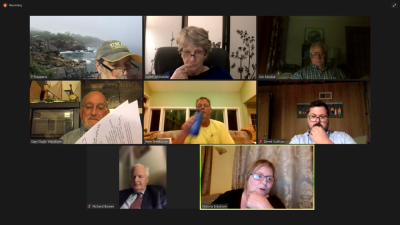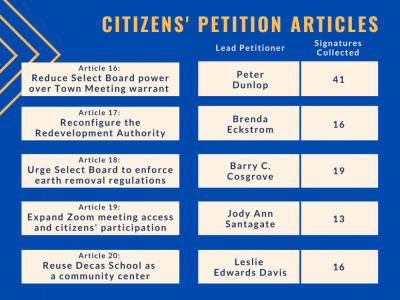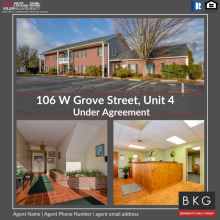Citizens’ petition articles won’t be backed by Select Board
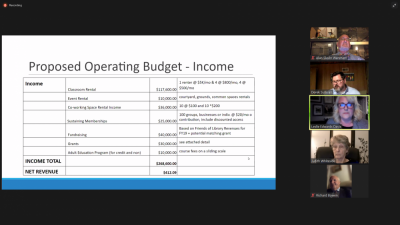
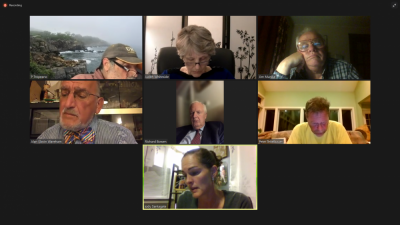
After more than two hours of presentations and discussions on Oct. 12, the Select Board ultimately decided not to recommend any of the five citizens’ petition articles that will be put to a vote at Town Meeting on Oct. 25.
The Board even went so far as to revisit last week’s vote to recommend the citizens’ petition article that would reduce the board’s control over the Town Meeting warrant. When voting on the article a second time, Select Board Chair Judith Whiteside joined board members Patrick Tropeano and Peter Teitelbaum in ultimately deciding not to recommend the article.
Select Board members Alan Slavin and Jim Munise favored recommending the article.
Only Munise favored recommending the other four citizens’ petition articles as well.
The Select Board invited the lead petitioners for the other four articles to present their articles to the board during the Oct. 12 meeting.
Resident Leslie Edwards Davis’ petition article seeks to turn the soon-to-be-vacant John W. Decas Elementary School into a community center. Ideally, Davis explained, the amenities at the Decas School would be used to meet a variety of community needs — the classrooms would provide space for childcare and adult education programs, an on-site food pantry would be one way to use the industrial kitchen, and additional rooms could be used as coworking space.
(Advocates for the article have set up a site to promote their idea: www.DecasForWareham.com.)
Board members praised Davis’ presentation and acknowledged that the town would benefit from having the type of community center that was proposed, but they expressed a variety of concerns. Town Counsel Richard Bowen said he was concerned that portions of the article — namely portion that the article appears to give custody of the Decas School to a committee the article would create — would not hold up to legal scrutiny.
Tropeano expressed concern that Town Administrator Derek Sullivan hadn’t particularly been involved in the plans. Teitelbaum said he was under the impression that childcare programs had expressed a strong desire to stay in Onset.
Whiteside emphasized that the town already lacks the funds it needs to do things like hire additional police officers or put a new roof on the library. She noted that using town money to support a community center would mean “taking it from some place else” in the budget.
Jody Santagate’s petition article would require the majority of town board and committee meetings to hold all meetings with remote access through Zoom or another program that allows citizens to watch and participate in meetings from home.
“I feel like if anything came from the pandemic as a positive, it’s that we’ve been able to expand citizen participation remotely,” she said.
Santagate said that many people would benefit from having continued Zoom access to meetings, including people with disabilities, elderly residents and working caretakers who cannot leave loved ones at home, unsupervised, to attend meetings.
Slavin said he was concerned about Wareham Community Television having the money, manpower and equipment to continue providing Zoom meetings. Attorney Bowen said that if Gov. Charlie Baker’s emergency action — which is what made remote meetings possible — lapses, the citizens’ petition article might violate state open meeting laws.
Santagate’s petition also declares that any board that holds hearings with legally binding rulings would be “forbidden to refuse to acknowledge or accept comments from residents” during any time citizens are allowed to participate in a meeting as long as that citizen would not be speaking about an issue currently before a court of law. Bowen expressed concerns that the provision could “certainly run into a problem” with the Attorney General, as it appears to conflict with Massachusetts state law.
Resident Barry Cosgrove’s petition would urge the Select Board to audit the A.D. Makepeace Company’s past and present earth removal operations and, if needed, enforce the towns earth removal regulations.
If earth is removed from town, companies are supposed to clear that removal with the Select Board and pay the town 25 cents per cubic yard removed.
“It seems to me the town cannot afford to not, at least, do an inquiry to monitor, measure and report whether or not sand has been removed without appropriate licensure,” Cosgrove said.
He emphasized that the petition article was meant to “nudge” the Select Board “in a civil way and a constructive way and a polite” way to take action.
Although members of the Select Board expressed the desire to stop any potential unlicensed earth removal, they also encouraged people with evidence of illegal earth removal to file complaints with the director of inspectional services, who is responsible for enforcing town codes.
Finally, Brenda Eckstrom’s petition article would petition the state legislature to change who can serve on the Wareham Redevelopment Authority and how members are chosen. The proposed amendment would increase the Redevelopment Authority to seven voting members — four elected to five-year terms and three appointed by the Select Board.
Slavin said the Redevelopment Authority is a board that needs skilled members. He expressed concerns about the proposed new format for the board not because he is so satisfied with the work of the committee, but because elected members might not have relevant experience.
“I like the way the board is set up; I think it works well, and I’d like to see it continue that way,” Tropeano said, praising the things the existing Redevelopment Authority has accomplished.
Eckstrom had encouraged Whiteside and Teitelbaum, who are both members of the Redevelopment Authority, to recuse themselves from the vote. They each said they do not receive compensation from their positions on the board and noted that they file yearly statements of no conflict with the town clerk. Both voted against recommending this article.



.png)
